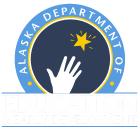- Cama-i, quyana tailuci!
- (Central Yup’ik)
- "Greetings, thank you for coming!"
Alaska Teacher Retention & Recruitment
Alaska’s Teacher Retention and Recruitment Playbook (August 2023)
The Playbook is the result of research, survey data, and an action plan created by the Governor's Teacher Retention and Recruitment Working Group and input from hundreds of stakeholders. The survey itself gathered information from over 4,000 educators. Contributors of the final Playbook included teachers, principals, superintendents, school board members, students, home school participants, special education participants, university members, and state government officials.
The purpose of the Playbook is to identify practical, professional, and policy recommendations to address Alaska's persistent issues with retention and recruitment. The TRR Playbook provides implementation strategies and recommendations for all stakeholder groups.
Read on to explore past work done by the TRR Working Group.
Since 2020, the State of Alaska has been working to improve teacher retention and recruitment. The first phase began with a directive by Gov. Michael Dunleavy to form a working group to identify the root causes of Alaska’s teacher retention and recruitment issues and to propose solutions to better attract and retain great teachers. The second phase included the publication of a TRR Action Plan, along with complete TRR Survey Results and additional appendices and findings. The state of Alaska is currently in the third phase – implementation.
The State of Alaska began the implementation phase in winter of 2022.
The first TRR Implementation convening was held on February 24, 2022. A recording of that meeting is available here. Download the slide deck here.
Participants provided initial feedback on implementation in a survey through March 31, 2022.
To subscribe to email updates including upcoming opportunities to provide feedback on Alaska teacher retention and recruitment, click here.
All Phase III meeting recordings, documents, and notes are available at aklearns.org/trr.
On April 20, 2021 the Governor’s Teacher Retention and Recruitment Working Group released a report and results from teacher surveys to identify the root causes of teacher retention and recruitment challenges in Alaska. In conjunction with the survey results, the working group also released a framework for action called the TRR Action Plan. These documents can be downloaded by clicking the icons below.
The TRR Action Plan provides the information necessary to address the root causes of Alaska’s educator recruitment and retention challenges. The recommendations and framework propose six essential areas for practical, professional, and policy recommendations.
The TRR working group also utilized existing research along with previously published reports on the topic specific to Alaska. The TRR Survey gathered data from over 4,000 educators including preferred choice rankings, interviews, and written comments.
“I would like to thank the members of the Teacher Recruitment and Retention working group for the many hours they spent together over the past year. Their works provides us with a framework for collaboratively addressing the myriad of issues that result in high teacher and principal turnover in our schools. I look forward to working with educators, policy-makers, and fellow Alaskans to keep attract and keep great educators for our students, Commissioner Michael Johnson said.
The purpose of this working group was to review the root causes of Alaska’s teacher retention and recruitment issues and propose solutions to better attract and retain great teachers. Knowing the cornerstone of a great educational program starts with a great teacher, this working group sought to problem solve this component of the system to ensure Alaska can provide an excellent education for every student every day. The Commissioner of Education, with the help of this working group, will develop a plan that proposes practical, professional, and policy recommendations for the Governor through research-based methods as well as represented stakeholder groups.
Purpose
The purpose of this working group is to review the root causes of Alaska’s teacher retention and recruitment issues and propose solutions to better attract and retain great teachers. Knowing the cornerstone of a great educational program starts with a great teacher, this working group will seek to problem solve this component of the system to ensure Alaska can provide an excellent education for every student every day. The Commissioner of Education, with the help of this working group, will develop a plan that proposes practical, professional, and policy recommendations for the Governor through research-based methods as well as represented stakeholder groups.
"The cornerstone of a great educational program starts with a great teacher. Alaska for too long has suffered from high teacher turnover rates and an inability to attract and retain quality teachers in some of the most remote parts of our state.
Therefore, I’ve instructed the Commissioner of Education to assemble a working group made up of teachers, administrators, and others to review the root causes of our retention and recruitment issues, including reviewing working conditions and benefits in order to attract and retain great teachers. The Commissioner, with the help of this working group will develop a plan that addresses this issue." – Governor Mike Dunleavy, 2020 State of the State Address
Membership
The working group was made up of members, advisors, and legislative observers representing Alaska regionally; rural, urban schools; teacher, administrator, student, school board roles; early career to long-term experience; Pre-K, K-12, higher education; and practitioners, support organizations, policy makers. Members provided insights and discussion around the topics of: existing literature on retention, existing literature on recruitment, new research on priorities for leaving, new research on priorities for staying, integrated solutions with current reality, findings and recommendations, and review of written reports.
Meeting Notes Summaries & Reading List
Click here to view TRR Meeting Notes Summaries and Reading List
